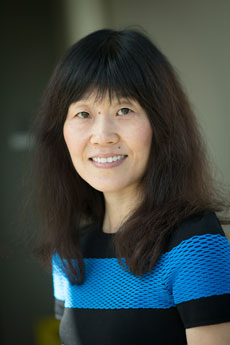IEEE SPS Chicago Chapter Distinguished Lecture by Prof. Qing Zhao
IEEE Signal Processing Society Chicago Chapter Distinguished Lecture Series
UIC ECE 595 Seminar Series
Speaker: Prof. Qing Zhao, Joseph C. Ford Professor of Engineering, School of Electrical and Computer Engineering, Cornell University
Date: Friday, September 17, 2021
Time: 11:00 am – 12:15 pm
Zoom link (sign-in required): https://uic.zoom.us/j/84613681029?pwd=RlhnWnJib08zVE12cTBpTHNUTXBTZz09
Title: Random Walk on a Tree for Stochastic Optimization and Learning
Abstract: The problem of searching for a few rare events of interest among a massive number of possibilities is ubiquitous. The rare events may represent opportunities with exceptional returns, extremely useful information in a deluge of data, or anomalies with potentially catastrophic consequences. The key challenges are that the search space is massive, observations are noisy and costly, and stochastic models of the rare events are unknown. Example applications include identifying infected individuals in a large population, detecting intrusions and attacks in large communication/computer networks, and the general problem of stochastic optimization for finding the optimal point of an unknown objective function in a high-dimensional space. We discuss in this talk a solution framework and its optimality in terms of learning efficiency. The key idea of the approach is to devise a biased random walk on a tree-based hierarchical representation of the search space. This is a joint work with Sudeep Salgia and Sattar Vakili.
Bio: Qing Zhao joined Cornell University in 2015, where she is the Joseph C. Ford Professor of Engineering. Prior to that, she was a professor with the ECE Department at University of California, Davis. She received the Ph.D. degree in electrical engineering from Cornell University in 2001. Professor Zhao is a Fellow of IEEE, a Marie Skłodowska-Curie Fellow of the European Union research and innovation program, a Jubilee Chair Professor of Chalmers University during her 2018-2019 sabbatical leave, and a Distinguished Lecturer of the IEEE Signal Processing Society. She was the recipient of the 2010 IEEE Signal Processing Magazine Best Paper Award and the 2000 Young Author Best Paper Award from IEEE Signal Processing Society. Her research interests include sequential decision theory, stochastic optimization, machine learning, and algorithmic theory with applications in infrastructure, communications, and social-economic networks.
Host: Prof. Mojtaba Soltanalian
Chapter Chair: Prof. Mojtaba Soltanalian msol@uic.edu
Chapter Vice Chair: Dr. Ouday Hanosh mohanos2@uic.edu
Date and Time
Location
Hosts
Registration
Speakers
 Prof. Qing Zhao of Cornell University
Prof. Qing Zhao of Cornell University
Random Walk on a Tree for Stochastic Optimization and Learning
Biography:
Qing Zhao joined Cornell University in 2015, where she is the Joseph C. Ford Professor of Engineering. Prior to that, she was a professor with the ECE Department at University of California, Davis. She received the Ph.D. degree in electrical engineering from Cornell University in 2001. Professor Zhao is a Fellow of IEEE, a Marie Skłodowska-Curie Fellow of the European Union research and innovation program, a Jubilee Chair Professor of Chalmers University during her 2018-2019 sabbatical leave, and a Distinguished Lecturer of the IEEE Signal Processing Society. She was the recipient of the 2010 IEEE Signal Processing Magazine Best Paper Award and the 2000 Young Author Best Paper Award from IEEE Signal Processing Society. Her research interests include sequential decision theory, stochastic optimization, machine learning, and algorithmic theory with applications in infrastructure, communications, and social-economic networks.
Email:


 Add Event to Calendar
Add Event to Calendar